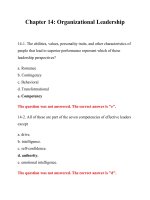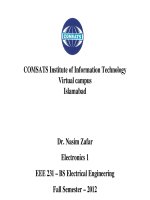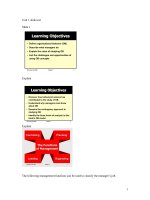Organizational behavior: Lecture 14 - Dr. Mukhtar Ahmed
Bạn đang xem bản rút gọn của tài liệu. Xem và tải ngay bản đầy đủ của tài liệu tại đây (727.8 KB, 58 trang )
Organizational
Behavior
(MGT-502)
Lecture-14
Summary
of
Lecture-13
Motivation
A state of mind, desire,
energy or interest that
translates into action.
Why Do We Care?
Ability
PERFORMANCE
Motivation
Opportunity
Performance =
f (Ability, Motivation, Opportunity)
Motivational Theories
Maslow’s
Hierarchy of
Needs
Alderfer’s ERG Theory
A three-level hierarchical need
theory of motivation that allows for
movement up and down the
hierarchy.
• Existence Needs
• Relatedness Needs
• Growth Needs
Theory X
Management view that assumes
workers generally dislike work and
must be forced to do their jobs.
Theory Y
Management view that assumes
workers like to work and under
proper conditions, employees will
seek responsibility to satisfy social,
esteem, and self-actualization needs.
Today’s Topics
Need Theories of Motivation
• Maslow’s hierarchy of need
theory
• ERG theory by Alderfer
David McClelland’s Theory of Needs
need for achievement
The drive to excel, to achieve in
relation to a set of standards, to
strive to succeed.
need for affiliation
The desire for friendly and
interpersonal relationships..
need for power
The need to make others
behave in a way that they would
not have behaved otherwise.
nPow
nAch
nAff
Need for achievement.
– The desire to do something better or
more efficiently, to solve problems, or
to master complex tasks.
– High need for achievement people:
• Prefer individual responsibilities.
• Prefer challenging goals.
• Prefer performance feedback.
Need for affiliation.
– The desire to establish and maintain
friendly and warm relations with others.
– High need for affiliation people:
• Are drawn to interpersonal relationships.
• Seek opportunities for communication.
Need for power.
– The desire to control others, to
influence their behavior, or to be
responsible for others.
– High need for for power people:
• Seek influence over others.
• Like attention.
• Like recognition.
Need Theories of Work Motivation
NEEDS
BEHAVIOUR
INCENTIVES
AND GOALS
Equity Theory
Individuals
Individuals compare
compare their
their
job
job inputs
inputs and
and outcomes
outcomes
with
with those
those of
of others
others and
and
then
then respond
respond to
to eliminate
eliminate
any
any inequities
inequities
Equity Theory
• Are your outcomes (eg., rewards or
pay) fair when compared to others’
outcomes?
– Peers
– Yourself in other situations
Self Input
Self Outcome
?
=
Other Input
Other Outcome
Equity theory.
– People gauge the fairness of their work
outcomes in relation to others.
– Perceived inequity occurs when there is
an unfavorable social comparison of
work outcomes.
– When perceived inequity occurs,
people will be motivated to remove the
discomfort.
Equity restoration behaviors.
– Change work inputs.
– Change the outcomes received.
– Leave the situation.
– Change the comparison points.
– Take actions to change the inputs or
outputs of the comparison person.
Expectancy Theory
A process theory that
states that motivation is
determined by the outcomes
that people expect to occur
as a result of their actions
on the job.
Expectancy Theory
People will be
motivated to perform in
those work activities
that they find attractive
and that they feel they
can accomplish.
Expectancy Model of Motivation
Effort
Effort
Perceived effort performance
probability
Performance
Perceived
performance reward probability
Reward
Perceived
value of reward
“If I work hard, “What rewards “What rewards
will I get the job will I get when
do I value?”
the job is well
done?”
done?”
Motivational Theories
What I
put in
Equity Theory
What I
get back
Can I get it?
Do I want it?
Expectancy Theory
Goal-Setting Theory
(Edwin Locke)
A motivational technique
that uses specific,
challenging and
acceptable goals and
provides feedback to
enhance performance.









